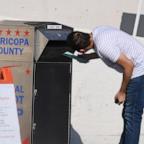Supermarkets Go High-Tech to Get Shoppers to Spend
Aug. 17, 2006 — -- Supermarkets are bigger than ever and adding all sorts of innovations to stay competitive ever since Wal-Mart, Costco and gas stations started selling groceries. Many of the bells and whistles supermarkets have added are designed to make customers linger longer and spend more money.
Whole Foods supermarkets in Washington, D.C., and elsewhere have added pleasant seating areas where shoppers can eat the ready-made food they just bought.
At Publix supermarkets in Atlanta, parents can try out "TV carts" for just a dollar. Kids can watch television while mom or dad shops in peace. Publix hopes the TV cards will increase revenue by keeping kids entertained and parents shopping longer.
If the TV screen doesn't mesmerize your child, other markets have play centers where you can drop kids off while you shop.
There are new high-tech toys for grown-ups, too, such as a computerized tablet called the shopping buddy found in some Stop and Shops. You can e-mail your grocery list to the device and it will alert you if any of your favorites are on sale.
The shopping buddy will also take your order while you're across town and alert you when it's ready for pickup. And if you can't find something, just ask your shopping buddy, which contains a map of the entire store.
"The shopping buddy has two primary benefits to shoppers" said Mike Grimes, vice president of sales and marketing development at Cuesol Inc., which makes the shopping buddy. "The first, saving money. The other thing it saves is time."
You can avoid frustration at checkout when the clerk doesn't know the difference between a Fuji apple and a pink lady with the "veggie vision" -- a computer scale and camera that identifies a fruit or vegetable and prices it for you.
And when it's time to pay, 2,000 stores have installed a pay by touch system that reads your fingerprint and debits your bank account in about 15 seconds.
Some supermarkets are also experimenting with tiny radio transmitters on their products to alert them if something is nearing its expiration date or needs to be restocked.




